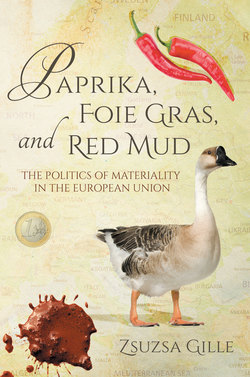Читать книгу Paprika, Foie Gras, and Red Mud - Zsuzsa Gille - Страница 11
На сайте Литреса книга снята с продажи.
GLOBAL ETHNOGRAPHY
ОглавлениеWhen we are interested in the question of how something we accept as a universal phenomenon or trend “spreads”—that is, moves across space and transforms places—we are in fact not studying imposition, or painting over, as the tabula rasa metaphor suggests, nor are we studying the abstract becoming particular the minute it touches the local. We are studying friction: the process by which things—democracy, animal rights—gain traction on seemingly alien, inferior, or inhospitable surfaces. This friction, however, is always concrete and particular, because the grittiness of the surface is dependent on the actual, local context. So the resulting “contact” itself is concrete, unique, exotic, or idiosyncratic. What we are studying is not the local particular but the global particular. Going back to the second set of binaries above, we no longer assume that the concrete can only be studied at the local or micro levels, nor that the abstract is only evident in studies of the macro or the global. That is, referencing Doreen Massey (1994), we no longer conflate level of abstraction with social or geographic scale. Massey’s critique is directed at David Harvey and others wedded to classical Marxist epistemology, who tend to look down on locality studies as inferior in their theory-generating capacity and in their capacity to support progressive—read universal and general—political solutions. Let’s take the market as an example. Most Marxists and many social scientists consider it an abstract and macro-level institution. Massey suggests, however, that if by concrete we mean the product of many determinations, as most usually do, then the market is not less concrete than certain economic and material practices at the level of the individual, the household, or the village. Therefore, it is possible to think of the market as concrete and particular, even as we recognize that it operates at the macro or even global scales. Economists and sociologists can certainly distill abstract laws or logics of the market, but that does not mean (a) that that logic acts alone or is the single cause of a range of phenomena or (b) that those “abstract” laws do not change in certain circumstances, under the pressure of concrete actors, human or nonhuman. Consequently, the market too can be the product of many determinations.
Disentangling the level of abstraction from social and geographical scale will yield the epistemological matrix seen in table 0.1.
Studying globalization as frictions therefore requires that I locate myself in the rubric of the global concrete. To understand what this means methodologically, let’s fill in table 0.2 following Michael Burawoy’s (1991) comparison of different social science methodologies. While he never explicitly identified the methodological perspective he and nine students, including me, elaborated, which we called global ethnography, it is easy to see why I have placed it in the upper right-hand cell. But first let me summarize what that perspective is in the collaborators’ own terms.
Table 0.1. Disentangling level of abstraction from social scale
Table 0.2. The relationship between geographical scales and levels of abstraction in different methodological traditions
In the 2000 book Global Ethnography, my colleagues and I, under the guidance of Burawoy, demonstrate how and why globalization and its associated processes and institutions should be studied at the local scale. We argue that people in different parts of the world and differently positioned in their respective societies experience globalization in radically different ways (Burawoy et al. 2000). We group these experiences into what we call the three “slices” of globalization: global forces, global connections, and global imaginations. In the first instance, people experience globalization as an external force impinging on the locality and changing their lives in ways over which they have no control, restricting their choices to defensive reactions or adaptations. These changes in general are negative, such as factories closing or welfare being cut as a result of pressures by supranational agencies committed to a neoliberal economic agenda.
People in other positions, however, may find that globalization and transnationalization, or the deterritorialization of the nation-state, also offer opportunities. For them, whether they are migrants finding employment in countries that are better off or political activists maintaining transnational contacts with movements abroad, globalization opens up a space in which they can build connections to improve their lives and better represent their interests. They actively participate in building these links, which in turn sustain them economically, socially, and culturally and which allow them to maneuver around the global forces that otherwise might be more constraining than enabling.
Finally, there are social groups that are not only able to take some control over the processes of globalization that affect their lives, but that actively engage in defining, contesting, and redefining discourses of globalization. They wage their battles much less with a localist and defensive agenda, and rather enter political struggles with alternative views of what globalization should mean and how it could work in their favor. Here the emphasis is on the material power of global imaginations.
This is what this methodological framework does, even as we the researchers are located in particular sites (sometimes more than one): inasmuch as we are interested in hooking up the local to the global, in the above-detailed three ways, we really study the concrete at the level of the global. In my three case studies, I too study the particular contacts and frictions between Hungary and the European Union. After I have analyzed the three events in the following empirical chapters, in the last two chapters I will be able to demonstrate that applying Global Ethnography makes visible a new modality of power in the European Union and will explain why the global particular is the only cell from which what I call the materialization of politics is visible.
